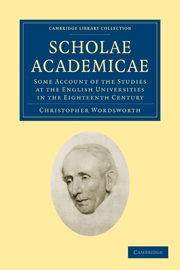 Scholae Academicae
Scholae Academicae Published online by Cambridge University Press: 07 September 2010
“If he haue leasure to be idle (that is to study) he ha's a smatch at Alcumy, and is sicke of the Philosophers stone, a disease vncurable but by an abundant Phlebotomy of the purse.”
J. Earle's Micro-cosmographie. [1628.]James Keill, whom we have mentioned as an anatomist, translated Lemery's. Course of Chemistry in 1698, thereby introducing English chemists to the current theory of the relations of acids and alkalis. But ten years before that time, J. J. Beecher of Mentz had died, and G. E. Stahl was following out his observations, which had already borne fruit in his Zymotechnia Fundamentalis, with an ‘experimentum novum sulphur verum arte producendi’ (1697), which resulted in the enuntiation of the theory of phlogiston, the terminology of which was retained or adapted even by our Cavendish and Priestley in England in the latter hah0 of the succeeding century, when they had passed to more positive observations and discoveries of the composition of water, and oxygen gas.
Long before a chair of Chemistry was endowed at Cambridge, we have Barrow's testimony to the ardour with which the study was pursued.
To save this book to your Kindle, first ensure [email protected] is added to your Approved Personal Document E-mail List under your Personal Document Settings on the Manage Your Content and Devices page of your Amazon account. Then enter the ‘name’ part of your Kindle email address below. Find out more about saving to your Kindle.
Note you can select to save to either the @free.kindle.com or @kindle.com variations. ‘@free.kindle.com’ emails are free but can only be saved to your device when it is connected to wi-fi. ‘@kindle.com’ emails can be delivered even when you are not connected to wi-fi, but note that service fees apply.
Find out more about the Kindle Personal Document Service.
To save content items to your account, please confirm that you agree to abide by our usage policies. If this is the first time you use this feature, you will be asked to authorise Cambridge Core to connect with your account. Find out more about saving content to Dropbox.
To save content items to your account, please confirm that you agree to abide by our usage policies. If this is the first time you use this feature, you will be asked to authorise Cambridge Core to connect with your account. Find out more about saving content to Google Drive.